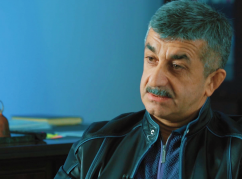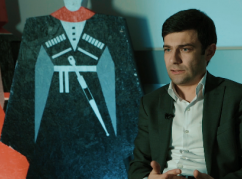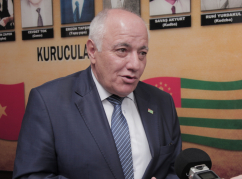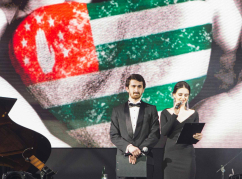The head of the MAD, a member of the Supreme Council of the WAC, Beslan Agrba, spoke about the ways of preserving the Abkhaz language, the approach to repatriation, the relationship of the Abkhaz Diaspora with the motherland in an interview to the WAC web information portal.
- One of the main tasks of the World Abaza Congress is to unite representatives of the Abkhaz-Abaza ethnic group throughout the world. What steps, in your opinion, should be taken to accomplish this difficult task? Is it possible to apply the eight-year experience of the systemic work of the MAD (Moscow Abkhaz Diaspora – ed.) in this matter?
- The task of uniting representatives of the Abkhaz-Abaza ethnos throughout the world, in my opinion, is still more — a certain vector of movement. We need to move in that direction. Because when we set tasks, we want to measure them. Let's say that all were united, or half, and so on. [Union of representatives of the Abkhaz-Abaza ethnos] – it is rather a qualitative direction, movement and qualitative results. Diasporas living in relatively normal conditions usually unite due to the threat of losing national identity. This is quite a serious threat to a certain kind of people, and people feeling this threat are trying to preserve their identity and unite. They create the core of these diasporas.
How are they trying to save? This happens through intercourse or ethnocultural events. Diaspora leadership is trying to carry out [these events] to involve representatives of the people. There is a very important and difficult point: to make these activities interesting to different social groups, different age levels, even gender should be taken into account. Some events are more interesting for men, others for women. Based on our experience, the most interesting are events that are held in large open areas. [At them] we can combine a variety of activities for every taste.
- You are a member of the Supreme Council of the WAC and head the MAD. Is there a work being carried out to attract members of the Moscow Abkhaz Diaspora to the Congress?
- To be honest, I do not think that formal membership in an organization with [relevant] records indicates the social importance of the organization or its importance in someone’s life. Perhaps I have such an unpleasant aftertaste from being in the Komsomol, the membership in which I considered very formal. It seems to me that per se, the fullness of an organization should not determine its popularity and how much people would like to take part in the events of this organization - people who feel sympathetic and empathic with the ideas of this organization.
- What, in your opinion, are the most effective levers of interaction with Diasporas should the Abkhaz state use? How does communication take place [between diaspora and state]?
- When I was elected to the position of the head of the Moscow Abkhaz Diaspora, I said in my speech: perhaps this will sound a bit paradoxical, but I will be happy and pleased if the number of the Moscow Abkhaz Diaspora decreases and the number living in Abkhazia increases. I think to some extent this is the task of the World Abaza Congress. Different Diasporas have different tasks. It largely depends on the [historical] homeland.
We have a unique situation. I have repeatedly spoken about this in different audiences in interviews. Because of the victory in the war (the Patriotic War of the people of Abkhazia - ed.), because of our desire for freedom, we received recognition of the independence [of the Republic] by Russia and several more states. This is a unique case. There are huge nations that do not have their own state. Moreover, of course, to implement a project called the Abkhaz State, the Abkhaz Republic is the most important task of all the citizens of Abkhazia, all representatives of the ethnic group. The task is very nontrivial, it requires the unification of efforts of all patriotically minded people, citizens of Abkhazia.
We must reformat ourselves, reformat the state, which in many respects is still molded according to some old Soviet casts. Public administration and other structures operating according to old casts are a completely different reality. This is precisely what leads to strong inefficiency. But not a single diaspora, not a single congress, can solve this problem, because in this project Abkhazia itself and its leadership should be the leader. However, for 10 years of the existence of already recognized Abkhazia, unfortunately, I do not see any meaningful started and developed program [in this regard]. [Programs] for reorganizing the system of state administration, law enforcement agencies, for the fight against corruption and criminality, for development economy. These are now popular topics.
I am ready to attribute myself, probably, to a number of those who criticize the government. In particular, there is no meaningful policy of repatriation and interaction with the Diaspora. [There must be] a meaningful repatriation policy: we need to understand who we are trying to bring home from our ethnic group, where we will settle them, what kind of work we will give them. If we talk about diasporas, then there are a lot of successful people in the diasporas who have realized and could have benefited their homeland to one degree or another. We need to build relationships with them correctly, attract, return, if we are ready to return. I do not see all this, but I believe that these should be mandatory questions. This is one of the first tasks of WAC: to implement the project of the Abkhaz state. The Diasporas have no other more serious tasks.
- What, in your opinion, should be the ideology of the Abkhaz state at the present stage of development?
- What kind of society we want to build? This requires an ideology. Before we are ready to say how we will manage, we must understand how we are going to live. What is our ideology? We have a state of poor and rich - or a state with a social orientation, or we are building a national state, Abkhaz, Abkhaz-Abaza, or we are building a democratic state in which all citizens will have equal rights?
For example, the only privilege of the Abkhaz ethnos will be in the fact that there will be budget programs for the development of language and, perhaps, demography. This will be an honest, clear and understandable position that we will offer. I think that any honest, clear and open position will find understanding among representatives of other ethnic groups, who are now in ignorance and are experiencing a certain discomfort regarding this, because they feel that there are certain nationalist appeals.
So, there are many problems. For some reason, we run away from them all the time. It is not necessary to run away, it is necessary to face them, not being afraid of them, to solve these problems. First of all, of course, ideologically. As soon as a person has clarity and understanding of how the leaders of the nation, the leaders of the people see this country in the future, they will have a desire to breathe, live and enjoy life, and be creative. The more uncertainty, fear, misunderstanding and lack of prospects, the less a person feels free, healthy, willing to do something, enjoy life. I think so.
- Building a repatriation policy, which aspects need to be paid the most attention?
- In general, we have a history of such a mentality, perhaps. It is based on [certain] non-radical conservatism, which is inherent in the Abkhaz - Apsuara. This is a relation to adats (norms - ed.), and so on. In addition, a secular character, our society has always been of a secular kind. In addition, we have a variety of religious denominations. There should be no advantage for any denomination. They should all be equal. Nevertheless, we must be very sensitive to these issues in order to maintain a balance between what I said: “secularism” and non-radical conservatism. [This conservatism] is in principle peculiar to people who live in the foothills and mountains. In our case, it is mitigated by the fact that we have the sea, so we, in my opinion, have a unique culture in this sense.
Of course, we should work out our own specific rules, our own specific “commandments” and laws that should be passed to people who come here. If we do not have our own rules, people who come here will set them themselves, it will be very dangerous for society, it will be a change in the religious and cultural landscape. Something that I personally would not want to happen. We have our own, unique one.
Although due to the severe degradation that is happening in our country and connected with the absence of normal state institutions, with disbelief in the moral and ethical values that have been created over the centuries, our uniqueness is now lost. It seems to me, however, that we need to preserve these remnants. And therefore, the question of creating a new community, repatriation, mixing of various people with different mentality, must be approached delicately, working out their own rules. When you have your own clear rules, and you involve [in them] another person, he also accepts these rules and begins to live by them.
- Today, the people of Abkhazia have an acute problem of preserving the Abkhaz language, both within the state and beyond. How does the MAD contribute to resolution of this issue to in Moscow? What actions should WAC take to preserve the Abaza and Abkhaz languages?
- We tried and are trying to cope with this through the creation of schools and workshops of the Abkhaz language at the Moscow Dance Ensemble. It seems to me that this does not work very well, that the solution to the language issue will be easier to implement when such a solution is found primarily in Abkhazia.
In Abkhazia, as far as I know, there are [language] programs funded by government and charity foundations. Various programs and aids are produced by groups of enthusiasts and philologists for the development of the language. There is still a need to take incentive and restrictive measures. I don’t think I’m inventing a bicycle; most likely this practice is used in many countries. [A restrictive measure may be] For example, the impossibility of taking positions in the public service without knowing the language, the inability to obtain citizenship without knowing the language. At the same time, significant prizes can be given to encourage the best students of the year both in Abkhazia and abroad.
A person should not be discouraged by what is bad in his homeland, either at home or in a family. When a family is bad, a person wants to be at home less often, leave the family, leave this company that causes despondency for him. If there is a lot of depression in your homeland, if it causes depression due to lack of prospects, then you don’t really understand why you should study its language.
As an example. I had a project in Italy. I ran it with my Italian partners. When it started, I was very excited, hired a teacher of Italian. I began studying the language, listening to Italian music, arias. I wanted to learn the language. However [later] the project failed, the partners were not very decent people - and I abandoned this topic. This may be a “childish” reaction, but nevertheless, it is peculiar to man. A person is very reflective about many things. It seems to me that the task of learning a language will be solved when people have a desire to learn it. If a person wants to work for the government. The more stylish, fashionable, and developing it is, the greater will be the pride that you are an Abkhaz, you will want to know the language among other nationalities living in Abkhazia. They, too, with great pleasure will learn it.
- Last year, for the first time in the history of the MAD, the Day of the Abkhaz culture in Moscow was held, which received a lot of positive feedback among the Abkhaz-Abaza Diaspora and other residents of Moscow. Tell us about it.
- This is just such a rare case when you receive positive energy not only from your fellow countrymen, but also from guests of the event. At that day I clearly felt the importance of PR and work to attract people, because a week before this event - and it was held in a large park - there was practically no one there, maybe 50-60 people. We began to actively distribute flyers, invite people on local radio and other local media, used online resources. The residents were warned that there would be our event. There were many people. We were also lucky with the weather. Abkhaz are generally lucky.
It was very good, because there were so many different points of attraction. We had a lecture on Caucasian yoga, in which Zaur Jane spoke from Adygea, there were other speakers. We organized a performance of the Moscow Dance Ensemble. We have a wonderful children's ensemble. It just won all possible prizes in Moscow and many grand prizes at various competitions in Russia. There was a costumed Abkhaz wedding with a toastmaster. People were very interested. We had a food court with dishes of national cuisine, the queues were huge. The WAC stand and other stands worked, which sold various souvenirs. There was a performance of artists, including classical, pop singing.
There were a lot of people, it turned out to be a real holiday, during which everyone was happy to see each other, a holiday when everyone is smiling, “getting high” because they are together. I saw so many friends for the first time. We very rarely see each other. There were also those who rarely go to the already “bored” events. For example, to feasts or some performances. This is also wonderful, but theater is a definite art that someone loves, and someone does not. And here we have a variety of genres, there were a lot of folk moments. Tengiz Tarba gave a lecture on the Mountains of Abkhazia.
- Do you consider it necessary to hold such days not only in the Russian-speaking environment, but also in other places of residence of the Abkhaz-Abaza Diaspora around the world?
- I think it would be worth holding them in other places. I think it is not necessary to stop, it is necessary to look for some new forms of holding such events. You can come up with some new features, [events] with joint interactive actions. Involve people in some joint projects. The more modern and interesting these events will be, the more unity we will have. We have to unite not only due to the fact that everyone wears a Circassian coat, a hood, a dagger, but also through an attempt to combine our traditions and move them into modernity.
- Activities both in the MAD and the WAC are associated with certain financial expenses. What, in your opinion, is the most acceptable way of fundraising for such organizations?
- In some interesting way we could not solve this issue in Moscow. We have various events from time to time. Usually this is a big annual meeting that takes place in a restaurant. Tickets are bought for it, there are some number of sponsors who pay about five times more than the cost of one ticket. Everything else is covered mainly by several people. As far as I know, in the World Abaza Congress Ekzekov (Chairman of the Supreme Council of the WAC Mussa Ekzekov - ed.) is also the main financier.
Therefore, I do not have an answer to this question yet. I think we are not talented enough to find forms. Forms and methods for convincing our wealthy compatriots that it would be worthwhile for them to expand their mentality, their world view through understanding that there is a public good, that one cannot be happy if the whole society is unhappy, you should try to help this society.
If you donate money for events, somehow you improve your “karma”. Somehow you help the development of this society. When we say that we need to maintain a children's ensemble in Moscow, some of us answer: these children have parents, let them pay. We reply to this that not all parents have money, but [hear in response]: “let their children not go then”. Primitive and trivial answers. It is very difficult to encourage people to think about the fact that there is also a public good. Whether people don't really want to understand this, or they really don't understand. I do not know.
Another form is an attempt to “blow into copper pipes”, what wonderful people those who donate are to write about it in newspapers and magazines. But this also does not work very well, because many wealthy people, on the contrary, do not want some kind of openness, do not want to be talked about their donations. I once proposed several presidents, knowing the Abkhaz law “On charity”, to amend [it] like the ones that exist in developed countries. For example, providing tax benefits and relief [for donors], but in this sense, no one agreed to coopetrate.
- You said that one of the main tasks of WAC and Abkhazia as a whole is to build a modern, developed state. How do you see your contribution? In addition, do you think that achieving this goal is the duty of every Abkhaz?
- I believe that this is my duty too. I really do not want - and somehow it is embarrassing - to be a “loser” and I will feel that way if the Abkhazia project as a state is not fulfilled. No matter how successful I am as a businessman, I will always feel the bitterness of defeat that I could not help solve this problem. It is my duty, I am trying to fulfill it. Sometimes, after midnight, I feel less optimistic when talking about it. [laughing] (Interview took place after midnight - ed.)





to login or register.